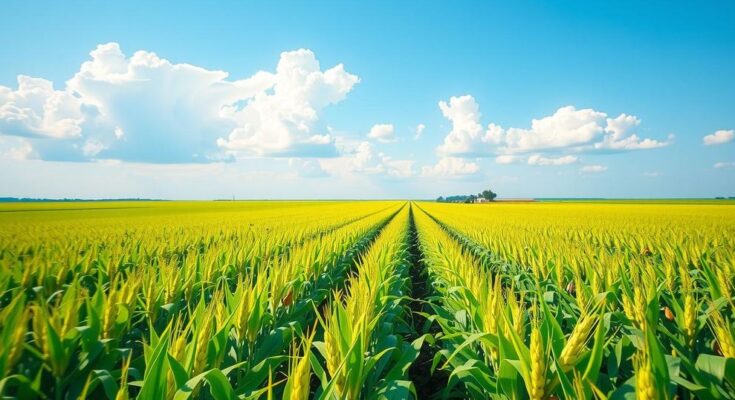Rising CO₂ levels threaten global food security by decreasing crop protein and nutrient content. Enhanced photosynthesis in staple foods like rice, corn, and wheat comes at the cost of reduced nitrogen and minerals, leading to potential health issues in vulnerable populations. Experts call for nature-based solutions and more research on plant biology to mitigate these effects.
Recent studies indicate that increasing levels of atmospheric carbon dioxide (CO₂) significantly impact crop nutrition and global food security, alongside the effects of climate change on rainfall patterns. Elevated CO₂ enhances photosynthesis in major crops like rice, corn, and wheat, leading to growth acceleration. However, this boost comes at the expense of nitrogen content, reducing the plants’ capacity to produce protein and amino acids, resulting in lower nutritional values.
Research published in Engineering highlights findings that global atmospheric CO₂ has decreased nitrogen content in numerous crops and woody plants by 14% and 21%, respectively. Additionally, elevated CO₂ concentrations have lowered mineral nutrients in rice and maize. Notable reductions include phosphorus by 1.0% in rice and 7.1% in maize, sulfur by 7.8% and 2.1%, iron by 5.2% and 5.8%, zinc by 3.3% and 5.2%, copper by 10.6% and 9.9%, and manganese by 7.5% and 4.2%.
The reduction of essential amino acids in wheat grains has been particularly alarming, with decreases noted at 7.4% due to heightened CO₂ levels. These declines present critical dangers, especially to marginalized communities, warns Professor Felix Dakora, a noted researcher from the Chinese Academy of Agricultural Sciences. He asserts that the prevalence of protein-calorie malnutrition and micronutrient deficiencies is likely to rise globally, particularly in nutrient-deficient regions like Africa.
Dakora elaborates on the wider ramifications of diminished nutrient content, indicating that livestock fed low-nutrient pastures produce meat, milk, and eggs similarly deficient in nutrition. Furthermore, grains lacking essential minerals could lead to an increase in health issues such as diabetes and nutrient deficiencies within human populations.
In response to this pressing issue, the research team emphasizes the need for nature-based solutions to climate change, such as the Great Green Wall of Africa, which seeks to restore 100 million hectares of degraded lands. However, a deeper understanding of plant biology and climate change interactions is required, particularly concerning soil microbes that enhance nutrient availability.
Dr. Lewis Ziska, an environmental health sciences associate professor at Columbia University, stresses the necessity of examining how elevated CO₂ affects plant chemistry and medicinal plants. He calls attention to the unclear consequences of alterations in plant chemistry on the global food chain and ecosystems.
In summary, the increasing levels of atmospheric CO₂ are profoundly affecting crop nutrition and global food security by enhancing growth while simultaneously diminishing essential nutrients. These changes pose significant risks, particularly to vulnerable communities, and highlight the urgent need for innovative solutions and further research into the complex interactions between climate change, plant biology, and nutritional content.
Original Source: cosmosmagazine.com




